GreenAir’s monthly round-up of news, features and comment from around the world ………..

Progress on decarbonising the airline sector has been slow this year, says IATA chief
We haven’t made as much progress as we wanted, or is needed, on decarbonising the aviation sector, IATA Director General Willie Walsh said in his end-of-year industry briefing to the media in Geneva. Blame was attached to governments and big oil producers for the slow investment in sustainable aviation fuel facilities, with anticipated SAF production in 2024 falling significantly short of IATA’s own expectations. Aircraft and engine manufacturers also came in for criticism over supply chain challenges that had resulted in a big shortfall of new, more fuel-efficient aircraft deliveries this year, with the result that the global fleet was on average older than ever, leading to environmental and economic consequences. However, the airline industry as a whole is on the road to a full recovery from the pandemic and global passenger numbers in 2025 are expected to pass the five billion mark for the first time, although the sector’s CO2 emissions may also reach an all-time high.

Financing will be paramount for achieving our collective goals for a net zero future, says ICAO chief
Investment in scaling up global production of renewable fuels in the pursuit of the aviation industry’s Net Zero emissions target was at the forefront of discussions at this year’s Aviation Carbon conference in London. With Europe introducing from January sustainable aviation fuel (SAF) blending mandates, as well as monitoring requirements on aircraft non-CO2 impacts, industry concerns were raised over the complexity and cost of new regulations facing airlines. IATA’s SVP Sustainability and Chief Economist, Marie Owens Thomsen, criticised fossil fuel subsidies and the lack of investment by oil majors in the energy transition. Outcomes from the recent COP29, which have positive implications for ICAO’s CORSIA carbon scheme, and raising finance for SAF development, were central to a speech by the UN agency’s Secretary General, Juan Carlos Salazar.

Commentary: China’s fair and equitable solution to civil aviation’s climate challenge
Like other countries, China’s civil aviation industry faces difficulties in fundamentally changing its aviation energy mix, which is primarily reliant on fossil jet fuel in the short term, and the large-scale application of deep decarbonisation technologies that balance availability and affordability. In the long term, as the most populous developing country, China has a vast potential demand for civil aviation transport, making the energy transition very challenging. However, a Five-Year Plan is underway for the green development of the industry. Against this backdrop is an insistence by China that the transition must be fair and equitable to developing countries, particularly regarding ICAO’s CORSIA scheme. Dr David Ma, an expert in Chinese civil aviation climate policy, analyses China’s current position.

UK government sets out new Jet Zero focus and launches consultation
on CORSIA scheme
The Jet Zero Council, a collaboration with industry set up by the previous UK government, has been relaunched as the Jet Zero Taskforce, with the aim of streamlining aviation decarbonisation priorities as the sector strives to reach its net zero emissions by 2050 target. The Taskforce will support the production and delivery of sustainable aviation fuels and zero emission flights, as well as look at how to improve aviation systems to make them more efficient. It will also explore the sector’s demand for GHG removals and the non-CO2 impacts of aviation. The UK’s SAF mandate, which takes effect from January 1, has now officially been signed into law, requiring 22% of all jet fuel to come from sustainable sources by 2040. The government has also started a public consultation on the implementation of ICAO’s global carbon offsetting scheme CORSIA, how it will be regulated in the UK and the penalties for non-compliance.

European and US research programmes expand to better understand
aviation non-CO2
As calls for action increase over the climate impacts of aircraft contrails, airborne research is intensifying with the expansion of two key projects in Europe and the US. In Germany, Lufthansa has started converting an Airbus A350-900 for use as a flying research laboratory as part of IAGOS-CARIBIC, a long-running European programme that uses commercial airliners to gather data on air quality for scientific evaluation. The A350 will be equipped with around 20 measuring instruments for a multi-year project beginning late next year to measure trace gases, aerosol and cloud parameters on selected long-haul flights. In the US, engine manufacturer GE Aerospace and NASA have just completed two flights with a Boeing 747 testbed aircraft to record three-dimensional imaging of contrails to better understand how they form and behave in certain conditions. The 747’s emissions were scanned using LiDAR technology installed on a following aircraft.

T&E joins aviation and climate scientists in urging action to reduce warming contrails
A global coalition of around 50 scientists specialising in climate and aviation-linked disciplines has signed an open letter warning of the warming impacts of aircraft contrails and calling on global decision-makers to urgently address the problem. Among the signatories is Jean-Pascal van Ypersele, a Belgian climatologist and former vice chair of the UN’s Intergovernmental Panel on Climate Change (IPCC). Contrails are the most significant of aviation’s non-CO2 effects, said the scientists in their letter. The communiqué was published by Brussels-based climate advocacy group Transport & Environment (T&E), which has also just released a report recommending deviating flight paths that it claims would halve the number of warming contrails by 2040, with a climate benefit substantially larger than the impact of the CO2 emissions caused by the extra fuel burn.

EASA releases status report on Europe’s SAF production and readiness to meet blending targets
With the EU about to activate its sustainable aviation fuel blending mandate, the European Union Aviation Safety Agency (EASA) has released an assessment of Europe’s preparedness to deliver required volumes of SAF up to 2030. The blending requirement will escalate from a minimum 2% of jet fuel composition by the end of 2025 to 70% in 2050 for supplies dispensed at airports across the EU’s 27 member states. EASA concludes that by 2030, when the blending mandate reaches 6%, there will be sufficient European production of SAF through multiple pathways to meet the requirements of the ReFuelEU Aviation regulation, which governs the mandate. But it warns rapid action is needed to ensure that a sub-target, initially 0.7%, is achieved for the use of increasingly important synthetic aviation fuels, or e-fuels. The report examines the capacity of member states to produce the new fuels during the next five years, based on an assessment of the sector’s performance in 2023 and the addition of updated projections.

New study highlights differing strategies and barriers to decarbonising
European aviation
A new study by UK-based consultancy CFP Energy has identified a significant divergence of strategies to decarbonise aviation in the UK, France and Germany, and serious impediments to the industry’s ability to reach its net zero emissions targets. The report was based on surveys of chief financial officers and risk management professionals of more than 500 organisations in high-emission industries including aviation, shipping, construction, data centres and manufacturing. The study reflected strong uptake of measures including biofuels, green certificates and voluntary carbon credits. But of the aviation operators surveyed in the UK and Europe, 95% of respondents expect a rise in carbon allowance demand, while funding limitations and insufficient access to new technologies are highlighted as key barriers to progress.

Carbon reduction consultancy
Watershed facilitates SAF certificate deals through SABA
Watershed, an international platform which helps some of the world’s biggest corporations to measure, report and reduce their carbon emissions, has facilitated the purchase of sustainable aviation fuel certificates (SAFc) by four major companies to help them compensate for emissions created by their corporate air travel. The deals were arranged through the Sustainable Aviation Buyers Alliance (SABA), for BlackRock, a global investment, advisory and risk management group, and financial and corporate technology companies Ripple, Samsara and Block. The SAF associated with their certificates will be allocated to US carrier Alaska Airlines, a founding member of SABA, while the four companies will be able to claim environmental attributes of the fuel as contributions to their own emission reduction targets.

IAG continues to go big on e-SAF as it inks 10-year offtake agreement with Infinium
Following shortly after a similar offtake deal with US e-SAF startup Twelve, International Airlines Group (IAG), the owner of British Airways, Iberia, Aer Lingus, Vueling and LEVEL, has announced a 10-year agreement to purchase power-to-liquid aviation fuel, or e-SAF, from California-based Infinium. The e-SAF will be produced at the clean-tech company’s Project Roadrunner plant in West Texas. Infinium says the plant will become the world’s biggest e-SAF facility once it is fully operational. The company has backing from Amazon’s Climate Pledge Fund and Bill Gates’ Breakthrough Energy Catalyst, and in September it raised a potential $1 billion through Brookfield Asset Management towards Roadrunner and the deployment of other e-fuel projects globally. It also has a strategic deal with American Airlines.

New partnerships formed to drive e-SAF production in Nordic markets
Two evolving Nordic e-SAF projects have been simultaneously boosted as the region ramps up a range of initiatives to progress lower-emission air transport. In Finland, clean technology group Liquid Sun has raised almost €4 million ($4.2m) in fresh seed funding to construct an e-SAF production testing facility. As Finland’s first pre-commercial e-SAF demonstrator plant, it will initially be housed in a 66-square-metre shipping container. Meanwhile in Denmark, renewable energy investor Copenhagen Infrastructure Partners (CIP), Copenhagen and Aalborg Airports and SAS Scandinavian Airlines have signed a collaboration agreement to support e-SAF production by Fjord PtX, an emerging renewable fuels business led by CIP, and to advocate for a Danish SAF sector. A new facility is due to open in late 2028.

Low-cost airline easyJet signs SAF MoU with Spanish energy company Moeve
Low-cost airline easyJet has signed a MoU with Spanish energy company Moeve, formerly Cepsa, for the latter to supply an unspecified amount of SAF until 2030. Moeve produces SAF at its La Rábida Energy Park (Huelva) from used cooking oil and easyJet will use the SAF on its key Spanish routes from 2025. Moeve is building a new plant with a flexible production capacity of 0.5 million tonnes of SAF and renewable diesel that will form part of the largest 2G biofuels complex in southern Europe when it begins operation in 2026. Meanwhile, easyJet has announced that its Head of Net Zero, Lahiru Ranasinghe, will become Sustainability Director, following the departure of Jane Ashton. Ranasinghe joined easyJet in 2019 after roles at Virgin Atlantic and British Airways.

Air New Zealand makes its largest-ever purchase of SAF to date
In an agreement with Neste, Air New Zealand has made its largest-ever purchase of SAF to date. The airline has purchased 23,000 tons (30 million litres) of unblended SAF for use at Los Angeles and San Francisco international airports through to February 2026. The fuel will be delivered via the fuel supply systems at both airports using Neste’s existing fuel supply capabilities. “This purchase represents 1.6% of Air New Zealand’s total fuel supply for our financial year 2025, meaning we will reach our SAF target for the year,” said the airline’s Chief Sustainability and Corporate Affairs Officer. “It is still a very small proportion of our total fuel use but it is four times more than the volume of SAF we used in our financial year 2024, so I am very happy with the trajectory.”

Aramco, Total Energies and SIRC to assess SAF production in Saudi Arabia
Saudi energy company Aramco, French energy company TotalEnergies and Saudi Investment Recycling Company (SIRC) have announced the signing of a Joint Development and Cost Sharing Agreement to assess the potential development of a sustainable aviation fuels plant in Saudi Arabia’s Eastern Province. The assessment will focus on “harnessing innovative engineering and technology solutions” that seek to recycle and process local waste or residues from the circular economy, such as used cooking oils and animal fats to produce SAF. The agreement was signed during a visit to the kingdom during a visit by French President Emmanuel Macron. “As Saudi Arabia’s tourism and aviation sectors expand, this could potentially benefit both domestic and international airlines,” said Aramco CEO Amin H. Nasser.

Willis Sustainable Aviation Fuels UK enters MSA with McDermott
Commercial aircraft engine lessor and aviation services provider Willis Lease Finance Corporation has announced its Willis Sustainable Fuels UK Ltd (WSFL) subsidiary has entered into a master services agreement (MSA) with engineering and construction solutions company McDermott. The MSA concerns early engineering, procurement and construction (EPC) related services for WSFL’s first planned SAF facility in Teesside, North-East England, which has an expected capacity of producing 50,000 litres per day of SAF. WSFL, which has received support from the UK government’s Advanced Fuels Fund, intends to deploy technology that produces next-generation SAF, either biogas-to-liquid or power-to-liquid, depending on the feedstock. The parties intend to enter into a sole-source negotiation of the EPC scope in 2025.

Logistics provider Rhenus joins Air France KLM Martinair cargo SAF programme
Global logistics service provider Rhenus has joined the Air France KLM Martinair Cargo SAF programme, which will support the company’s sustainability efforts while offering customers the opportunity to reduce their emissions. The SAF programme enables companies to contribute to the usage and development of SAF for their shipments and voluntary investment will support the air cargo operator’s efforts to scale SAF production.

Dutch SAF firm GAFT sends its pilot electrolysis unit to Greece for final testing
Dutch SAF firm GAFT is relocating its first-of-a-kind pilot electrolysis unit to Greece to complete final testing at major cement, magnesia and oil refining installations. The three-stage process of the ConsenCUS project is designed to test the unit in different environments, with varying industrial CO2 emissions inputs to demonstrate production of formic acid – the base for SAF – through combining industrial emissions and renewable energy.

Phillips 66 starts deliveries of SAF to United Airlines at Chicago and LAX
Fuels company Phillips 66 is to deliver SAF to United Airlines at Chicago O’Hare (ORD) and Los Angeles (LAX) international airports. It will supply 3 million gallons of SAF for use at ORD, with the potential to increase the supply to 8 million gallons through the first half of 2025. It will deliver an initial 600,000 gallons of SAF to United at LAX by the end of 2024. Phillips has commercial and logistical capabilities, including blending hubs in Illinois and on the West Coast.


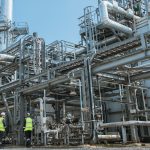
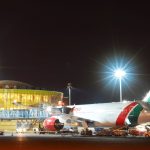
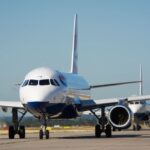
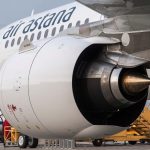

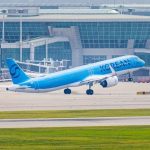



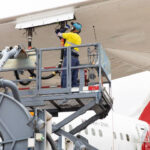





More News & Features
News Roundup October 2025
News Roundup September 2025
News Roundup August 2025
News Roundup July 2025
News Roundup June 2025
News Roundup May 2025